20 Exotic Berries You Should Consider Adding to Your Diet
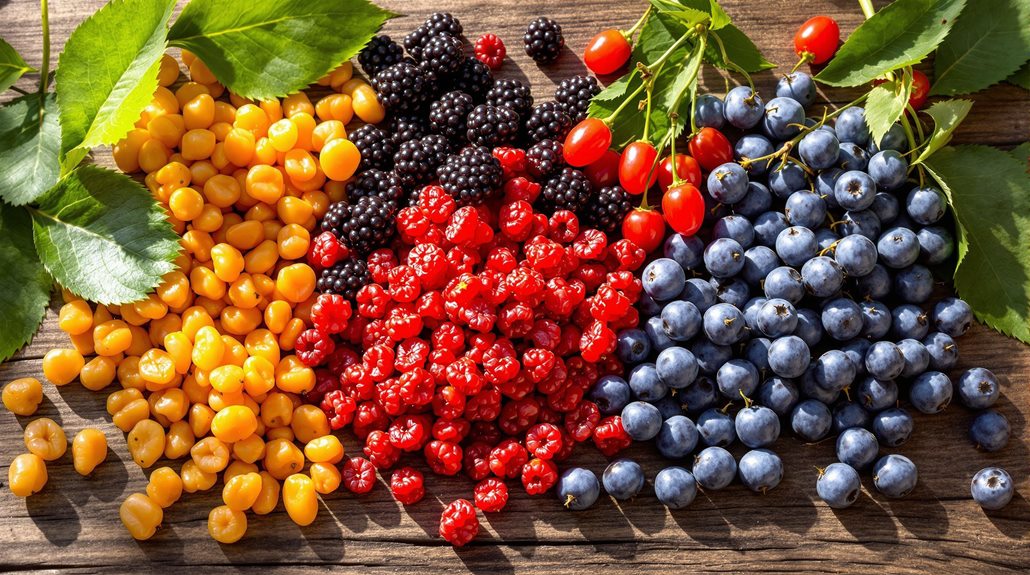
Investigate a lively array of exotic berries to improve your diet with rich flavors and impressive health benefits. Consider açaí, rich in antioxidants and heart-friendly fats, or camu camu with its potent vitamin C. Goji berries are perfect for a nutrient boost, while elderberries support your immune system. Savor the unique taste of aronia and its cardiovascular perks, or the versatile maqui's anti-inflammatory properties. Lingonberries are great for digestion, while sea buckthorn improves skin hydration. Uncover even more delightful options like jabuticaba, noni fruit, and cloudberry, each offering unique advantages for a well-rounded, exotic fruit experience.
Açaí Berry
Açaí berries, native to the lush landscapes of tropical Central and South America, pack a powerful punch of antioxidants, especially anthocyanins, which help combat oxidative stress and inflammation. When you incorporate these little powerhouses into your diet, you're doing more than just enjoying their unique flavor; you're also supporting your heart health. The antioxidants in açaí berries play an important role in improving your cholesterol levels, which is vital for maintaining a healthy heart.
Beyond heart health, açaí berries offer benefits for weight management. Their high fiber content helps keep you feeling fuller longer, reducing the urge to snack between meals. This can be particularly helpful if you're looking to maintain or lose weight without feeling deprived. Plus, the healthy unsaturated fats found in açaí berries provide a satisfying texture and flavor, making them a delightful addition to your meals.
Whether you blend them into smoothies or enjoy them in a bowl topped with granola, açaí berries can easily become a staple in your health-conscious diet. Their nutrient-dense profile guarantees that you're not just eating for flavor but for health, too.
Acerola Cherry
Though small in size, acerola cherries pack a mighty punch regarding nutrition. These lively fruits are one of the richest natural sources of vitamin C, offering about 1,677 mg per 100 grams, far outstripping the content found in oranges. This high vitamin C content, coupled with their bioflavonoids and carotenoids, bestows them with remarkable antioxidant properties. These factors make acerola cherries an excellent choice for those looking to bolster their immune system and reduce inflammation.
Consider adding acerola cherries to your diet to utilize their health benefits. They're not only nutritious but also low in calories, with roughly 50 calories per 100 grams. You can enjoy them in juices or as dietary supplements, thanks to their tart flavor and impressive nutritional profile. Here's a quick comparison of key nutritional facts:
| Nutrient | Amount per 100g |
|---|---|
| Vitamin C | 1,677 mg |
| Calories | 50 kcal |
| Bioflavonoids | High |
| Carotenoids | High |
| Uses | Juices, Supplements |
Aronia Berry

As you investigate the world of nutritious berries, you'll find aronia berries, commonly known as chokeberries, stand out due to their impressive antioxidant content. These small, dark berries are packed with phenolic compounds, making them a powerhouse for improving your health. Aronia berries are especially noted for their cardiovascular benefits. By regularly including them in your diet, you can potentially lower your blood pressure and cholesterol levels, contributing to better heart health.
A single cup of aronia berries contains about 25 grams of carbohydrates and is rich in dietary fiber, which supports digestion and keeps you feeling full longer. This fiber content not only aids your digestive health but also plays a role in managing your blood sugar levels, making aronia berries a smart choice for a balanced diet.
Moreover, studies show that consuming aronia berries may help reduce inflammation and improve immune function, providing extra layers of protection against different ailments. With their tart flavor, you can enjoy them fresh, dried, or as juice. Their versatility allows you to easily incorporate them into smoothies, salads, or desserts, making it convenient to reap their numerous health benefits.
Goji Berry
After exploring the benefits of aronia berries, let's turn our attention to goji berries, another nutrient-packed supplement to your diet. Known as wolfberries, goji berries are loaded with antioxidants, especially carotenoids, which help strengthen your immune function and general health. These berries are a powerhouse of vitamin A, providing over 100% of your Daily Value per serving, important for maintaining eye health and keeping your skin lively.
Goji berries also offer a complete set of necessary amino acids, which are critical for your body's protein synthesis. Regularly consuming these berries can lead to improved energy levels, better sleep quality, and even improved cognitive function. Their versatility means you can enjoy them raw, dried, or as an addition to smoothies, salads, and teas.
Here's a quick glance at the nutritional highlights of goji berries:
| Nutrient | Benefit | Usage Ideas |
|---|---|---|
| Antioxidants | Increases immune function | Add to teas |
| Vitamin A | Supports eye and skin health | Mix into smoothies |
| Necessary Amino Acids | Important for protein synthesis | Sprinkle on salads |
Embrace the lively benefits of goji berries and invigorate your diet effortlessly.
Noni Fruit
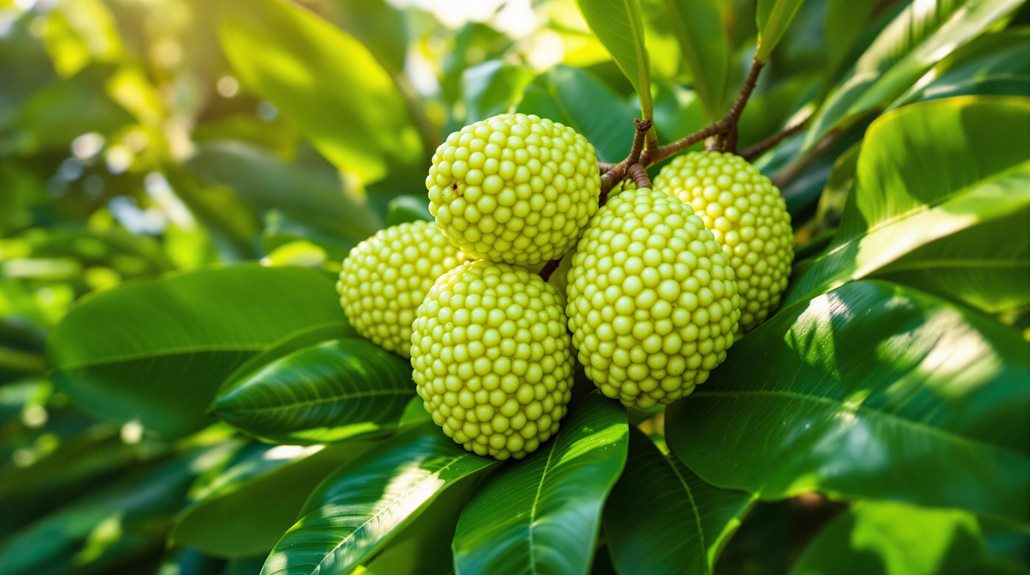
Have you heard about the intriguing noni fruit? Scientifically known as Morinda citrifolia, this fruit thrives in tropical regions and has been cherished in Polynesian cultures for its medicinal uses. While its taste is often described as bitter and strong, you'll find it more commonly in juices or dietary supplements rather than fresh from the tree.
Noni fruit is packed with vitamin C, which plays an essential role in enhancing your immune support. Alongside vitamin C, it's rich in antioxidants that help protect your body from free radicals, contributing to overall well-being. These antioxidants are not only significant for your immune system but also support cardiovascular health by potentially lowering cholesterol levels.
Research highlights the noni fruit's anti-inflammatory properties, making it beneficial for pain relief and promoting healing. Its ability to reduce inflammation might also assist in managing different health conditions. If you're looking to improve your diet with natural health enhancers, noni fruit could be a valuable supplement.
While its flavor might be an acquired taste, its health benefits are undeniable. Consider incorporating noni fruit into your routine through supplements or juices to harness its holistic health properties.
Pichuberry
Among the hidden gems of the fruit world, pichuberries, also known as Physalis peruviana, offer a delightful blend of sweet and tart flavors that's hard to resist. Native to the Peruvian Andes, these small, yellow-orange fruits are packed with a variety of vitamins including A, C, D, and B-complex, making them a nutritious supplement to your diet. One of the standout features of pichuberries is their low glycemic index, which makes them an excellent choice if you're managing blood sugar levels. This low glycemic index contributes to their growing popularity as a functional food among health-conscious individuals.
The health benefits of pichuberries don't stop there. They contain withanolides, compounds known for their hypoglycemic effects, which can support your metabolic health. Whether you enjoy them fresh or incorporate them into salads, desserts, or smoothies, pichuberries can improve both the flavor and nutritional value of your meals. By including pichuberries in your diet, you're not only indulging in their unique taste but also reaping the benefits of a fruit that supports better metabolic health. So next time you're looking for something new to try, consider reaching for pichuberries.
Camu Camu
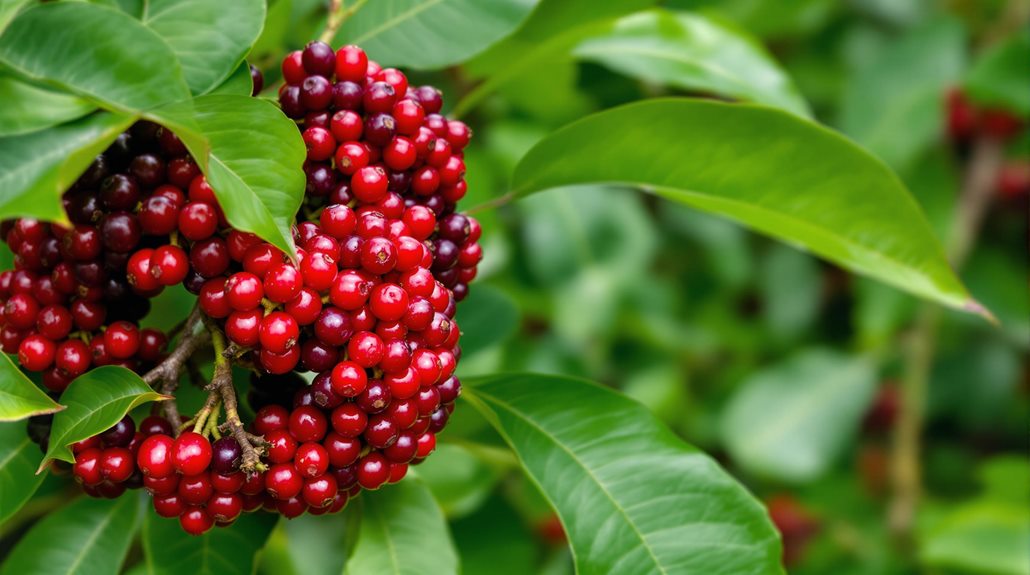
How about adding camu camu to your diet? This small, sour berry from the Amazon rainforest is a powerhouse of nutrition, especially noted for its high vitamin C content—offering up to 60 times more vitamin C per serving than an orange. Imagine the increase to your immune function with such a potent source of antioxidants. Camu camu's rich blend of flavonoids and polyphenols helps combat oxidative stress and reduce inflammation, promoting better general health.
| Nutrient | Benefit | Source |
|---|---|---|
| Vitamin C | Improves immune function | Camu Camu |
| Antioxidants | Fights oxidative stress | Camu Camu |
| Amino Acids | Supports body functions | Camu Camu |
Incorporating camu camu into your diet is easy, thanks to its availability in powdered form. This makes it a flexible ingredient for smoothies, health supplements, and even culinary dishes. Besides vitamin C, camu camu contains crucial amino acids, beta-carotene, and numerous minerals, further cementing its status as a superfood. Not only does it improve immune function, but it may also elevate mood and support skin health. So, next time you're looking for a nutritional enhancement, consider camu camu—your body will thank you!
Maqui Berry
Maqui berries, native to the Patagonia region of Chile and Argentina, have gained attention for their impressive health benefits. Packed with antioxidants, particularly anthocyanins, these berries might even surpass the antioxidant levels found in popular berries like blueberries. By incorporating maqui berries into your diet, you're giving your body a nutrient-dense enhancement with vital vitamins C and E, along with diverse minerals. These nutrients play an important role in supporting your general well-being.
Research indicates that maqui berries can help reduce inflammation and oxidative stress, which can be beneficial for your cardiovascular health. By targeting inflammation, these berries might aid in maintaining a healthy heart and improving metabolic functions. The indigenous Mapuche people have long recognized these health-promoting properties, which is why maqui berries are becoming popular in wellness circles.
You can easily enjoy maqui berries in powdered form, making them a flexible supplement to your meals. Add a scoop to your smoothies, yogurt, or baked goods to raise both flavor and nutritional value. By doing so, you're not only enhancing your diet but also tapping into the traditional wisdom of this remarkable berry.
Lingonberry
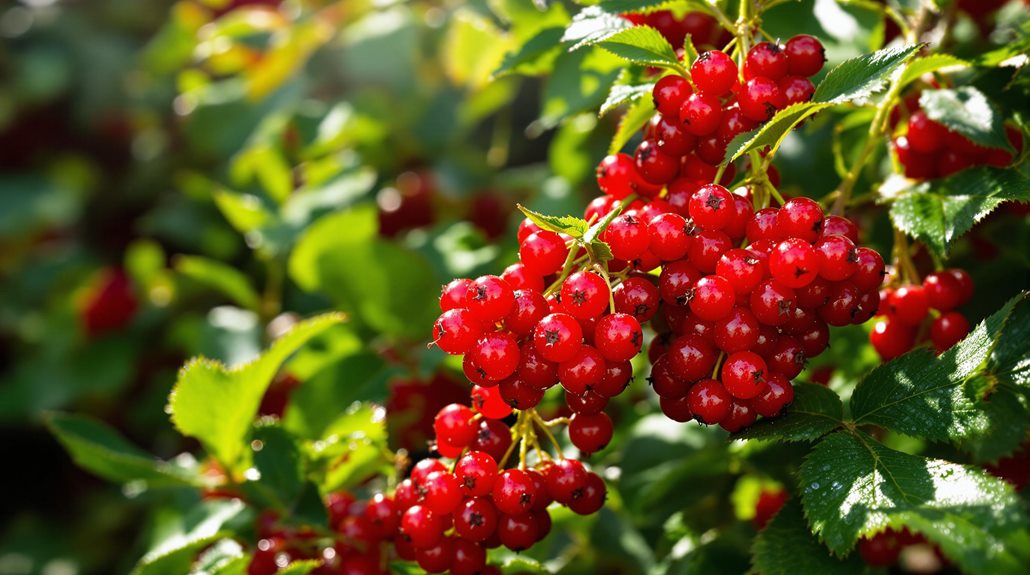
Lingonberries are small, lively red berries that hail from the boreal forests of Europe and North America. Known for their vivid tart flavor, these berries are packed with nutrients that can give your diet a significant enhancement. They're a rich source of vitamin C, essential for immune support and skin health. Furthermore, they contain high levels of fiber, which not only aids in digestion but also helps you feel fuller for longer, making them an excellent choice for weight management.
Incorporating lingonberries into your meals can offer several health benefits. They're renowned for their potential anti-inflammatory properties, thanks to the phenolic compounds they contain. This can be particularly beneficial if you're looking to reduce inflammation in your body. In addition, lingonberries may help regulate blood sugar levels and improve insulin sensitivity, making them a smart choice for enhancing metabolic health.
These berries are a staple in Scandinavian cuisine, often used in jams, sauces, and juices. Their low sugar content paired with their high fiber makes them a nutritious snack option. So, why not investigate the delightful tang of lingonberries and include a burst of nutrition to your diet?
Sea Buckthorn
Meet sea buckthorn, a nutrient powerhouse that's bursting with benefits for your health. This lively berry is a rich resource of vitamin C, packing up to 15 times more than oranges. Its antioxidant properties are impressive, thanks to over 190 bioactive compounds like flavonoids and carotenoids. These antioxidants can help protect your cells from damage and may offer anti-inflammatory effects.
If you're looking to elevate your cardiovascular health, sea buckthorn could be a valuable supplement to your diet. Studies suggest it might improve lipid profiles and lower cholesterol levels, contributing to a healthier heart. But that's not all—sea buckthorn is also rich in omega-7 fatty acids. These fats are fantastic for maintaining your skin's hydration and elasticity, keeping it looking youthful and radiant.
Don't overlook its potential for digestive health, either. Traditionally used in numerous cultures for its medicinal properties, sea buckthorn has been known to support your digestive system and improve immune function. With its array of benefits, incorporating sea buckthorn into your diet can be a simple yet effective way to nourish your body and adopt a healthier lifestyle.
Saskatoon Berry
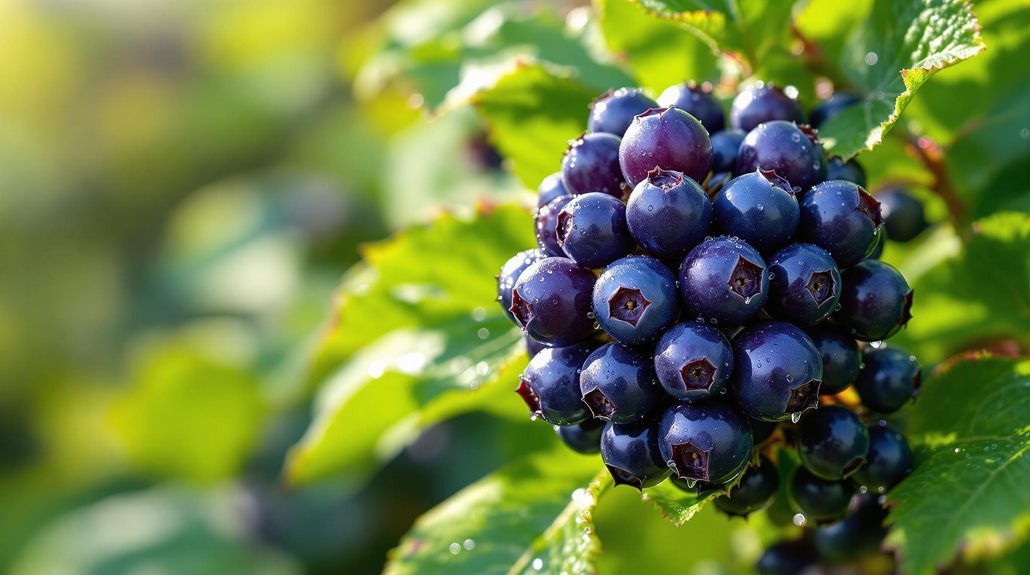
Saskatoon berries are a delightful supplement to your diet, offering a powerhouse of nutrients and a unique sweet and nutty flavor. These lively berries are packed with antioxidants, especially anthocyanins, which are critical for combating oxidative stress and reducing inflammation in your body. By including Saskatoon berries in your meals, you're not just indulging in their delicious taste but also supporting your general health.
One of the standout features of Saskatoon berries is their impressive dietary fiber content. With about 7 grams of fiber per cup, these berries can improve your digestive health and keep you feeling fuller for longer. This makes them an excellent choice if you're looking to manage your weight without sacrificing flavor. Plus, with only about 50 calories per cup, Saskatoon berries serve as a perfect low-calorie snack.
Moreover, these berries are rich in important nutrients like vitamin C, manganese, and iron, which play significant roles in enhancing your immune system and supporting energy metabolism. You can enjoy Saskatoon berries in a variety of ways, from incorporating them into desserts and jams to adding them into baked goods, making them a versatile supplement to your diet.
Chokeberry
Chokeberries, also known as Aronia berries, are a powerful supplement to your diet, packed with antioxidants like anthocyanins that fight oxidative stress and inflammation. Including these in your daily routine can help arm your body against harmful free radicals. You'll also find that chokeberries are an excellent source of dietary fiber. Just one cup provides about 9 grams, which is great for digestive health and can keep your blood sugar levels stable.
The cardiovascular benefits of chokeberries are significant too. Studies suggest they can help lower blood pressure and cholesterol levels, potentially reducing your risk of heart disease. By including chokeberries in your diet, you're doing your heart a favor. Additionally, these berries are rich in vitamins C and K. A single cup offers around 20% of your daily requirement for both, supporting your immune function and bone health.
You can enjoy chokeberries in many forms—fresh for a tart treat, or transformed into juices, jams, and baked goods. So, why not give them a try? Incorporating chokeberries into your diet could be a delicious way to enhance your general health.
Cloudberry

As one of the lesser-known gems from the northern regions, cloudberries (Rubus chamaemorus) offer a unique supplement to your diet. These bright orange berries thrive in the arctic and subarctic climates of Scandinavia, Canada, and Alaska. Bursting with vitamin C, cloudberries can provide about 30% of your daily recommended intake per 100 grams, making them a powerful ally in improving your immune system. Their high antioxidant content, including carotenoids and polyphenols, makes them effective in combating oxidative stress and inflammation.
| Nutrient | Benefits | Source Regions |
|---|---|---|
| Vitamin C | Immune support | Scandinavia |
| Antioxidants | Reduces oxidative stress | Canada |
| Dietary Fiber | Digestive health | Alaska |
The distinct tart flavor of cloudberries makes them a delightful supplement to diverse culinary creations. They're commonly found in jams, desserts, and traditional dishes in northern cultures. Besides their taste, cloudberries are a great source of dietary fiber, supporting your digestive health and promoting a feeling of fullness. Including cloudberries in your diet not only enriches your meals with unique flavors but also improves your nutritional intake. So, next time you're exploring exotic fruits, don't overlook the nutritional powerhouse that is the cloudberry.
Haskap Berry
When you're looking to add a nutritious powerhouse to your diet, consider the haskap berry. Known as Lonicera caerulea, these berries are native to Japan and Siberia. They boast an elongated shape and a sweet-tart flavor that makes them a unique enhancement to your meals. Haskap berries are packed with antioxidants, particularly anthocyanins. These compounds play a vital role in reducing inflammation and combating oxidative stress in your body.
One of the standout features of haskap berries is their impressive vitamin C content. This important vitamin supports your immune system and elevates skin health. Furthermore, a one-cup serving of these berries provides about 81 calories, along with dietary fiber and vitamin A, which promote comprehensive wellness. The dietary fiber aids digestion and helps keep you feeling full longer, making it easier to manage your weight.
Research indicates that haskap berries may also support cardiovascular health. They're known to improve blood circulation and lower cholesterol levels, contributing to a healthier heart. You can enjoy haskap berries in a variety of ways, from jams and jellies to smoothies and baked goods, making them a delicious and versatile option for your diet.
Jabuticaba
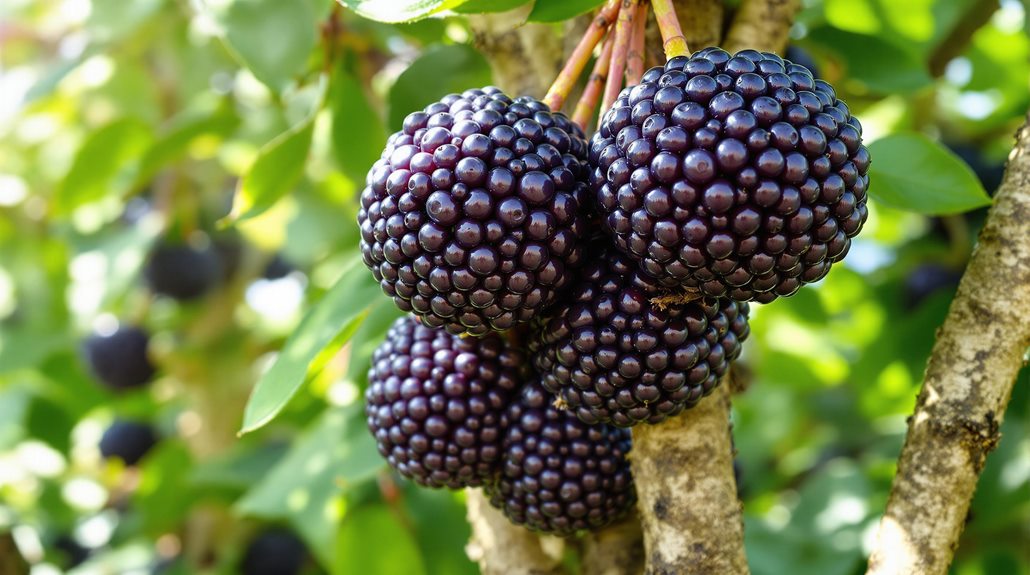
Situated within the landscapes of Brazil, jabuticaba (Myrciaria cauliflora) offers a delightful burst of flavor and nutrition. This unique fruit grows directly on the tree's trunk, resembling grapes with its sweet, tart taste. Incorporating jabuticaba into your diet brings a wealth of health benefits. It's packed with antioxidants, especially anthocyanins, which are known to combat oxidative stress and may reduce inflammation. These properties make jabuticaba a great ally in maintaining general health.
Jabuticaba is also high in vitamin C, providing over 30% of your daily value per 100 grams. This crucial vitamin supports your immune system and promotes healthy skin. Including jabuticaba in your meals not only improves your diet with vital nutrients but also contributes a unique twist to your culinary experiences. In Brazilian cuisine, this versatile fruit is transformed into delicious jams, jellies, wines, and liqueurs, showcasing its adaptability in both sweet and savory dishes.
With only about 50 calories per 100 grams, jabuticaba is a low-calorie, nutrient-rich supplement to a healthy diet. Consider incorporating this exotic berry into your meals, enriching your palate while supporting your health.
Mulberry
Moving from the lush groves of jabuticaba, let's investigate another nutrient-packed berry: the mulberry. Rich in dietary fiber, mulberries provide about 2.7 grams per 100 grams, making them a valuable ally for digestion and blood sugar stability. Their high fiber content can help regulate your digestive system, keeping it functioning smoothly and supporting general health.
Mulberries are an excellent source of vitamin C, offering around 36% of your daily recommended intake in just a 100-gram serving. This vitamin is vital for enhancing your immune function and maintaining healthy skin. Including mulberries in your diet can help strengthen your body's defenses against common illnesses and contribute to colorful skin health.
Moreover, mulberries are packed with antioxidants, particularly resveratrol, known for its potential to reduce inflammation and protect against chronic diseases. Antioxidants play an important role in maintaining your health by neutralizing harmful free radicals in the body.
Iron, another key nutrient found in mulberries, supports red blood cell production and energy levels, helping prevent anemia. Versatile in culinary uses, you can enjoy mulberries fresh, dried, or in smoothies, jams, and desserts, making them a delicious and nutritious enhancement to your diet.
Elderberry
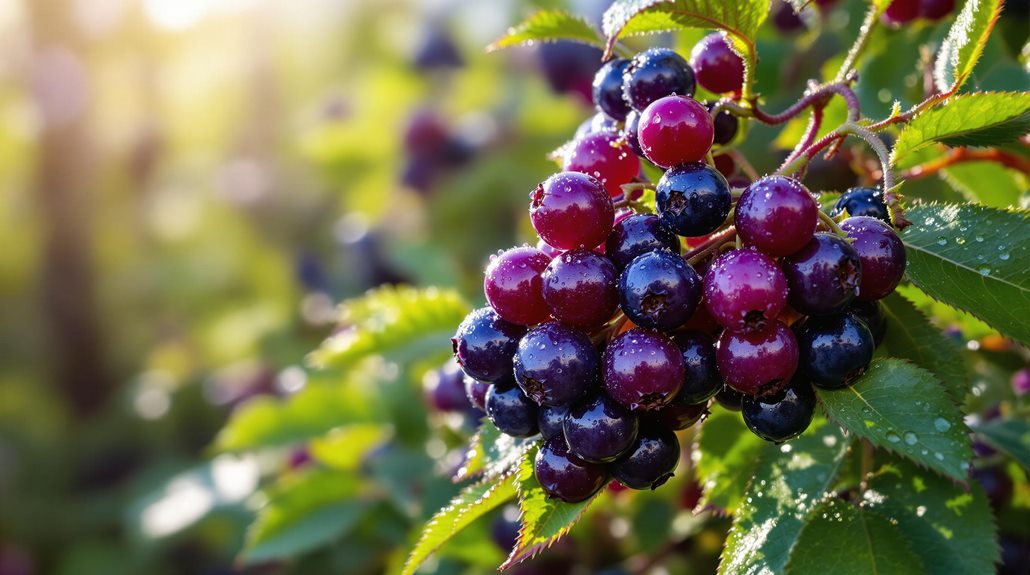
Elderberries, bursting with antioxidants, are a powerhouse of health benefits, thanks to their high concentration of flavonoids that combat oxidative stress and inflammation. These tiny, dark berries are not just flavorful; they're a potent ally for your body. By including elderberries in your diet, you can elevate your immune system, potentially reducing the duration and severity of cold and flu symptoms. You'll find that their antioxidant properties help protect your cells from damage, while their anti-inflammatory effects can improve respiratory health and ease allergies.
Elderberries also contribute to balanced blood sugar levels, supporting comprehensive metabolic health. Their ability to aid in detoxification processes makes them a smart choice if you're looking to improve your body's natural cleansing mechanisms. Regardless of whether you use elderberry in syrups, jams, or supplements, you're adding a versatile ingredient to your culinary creations. Try incorporating them into smoothies or baked goods for both flavor and health benefits.
If you're seeking a natural way to strengthen your body's defenses and support your health, elderberries are an excellent option. Their unique properties offer a blend of benefits that can enrich your well-being in delicious ways.
Barberry
Barberry, a lively and tart berry, is not just a flavorful improvement to your meals but also a powerhouse of nutrients. Rich in vitamin C, barberries can elevate your immune system while providing a burst of tanginess to your dishes. Whether you toss them into stews, sprinkle them over rice, or mix them into sauces, barberries provide a unique culinary experience. But that's not all—they're packed with health benefits too.
Containing beneficial alkaloids like berberine, barberry possesses strong antimicrobial and anti-inflammatory properties. These qualities make it effective in traditional medicine, especially in treating digestive disorders and infections in Middle Eastern and Asian cultures. If you've been struggling with digestive issues, incorporating barberry into your diet might offer some natural relief.
Furthermore, research shows that berberine may aid in diabetes management by helping lower blood sugar levels and improving insulin sensitivity. This makes barberry a potentially valuable enhancement to the diet of those managing diabetes. You can consume these berries in different forms—dried, powdered, or as an herbal supplement. So, why not investigate the benefits of barberry and give your meals a nutritious twist?
Amelanchier Berry
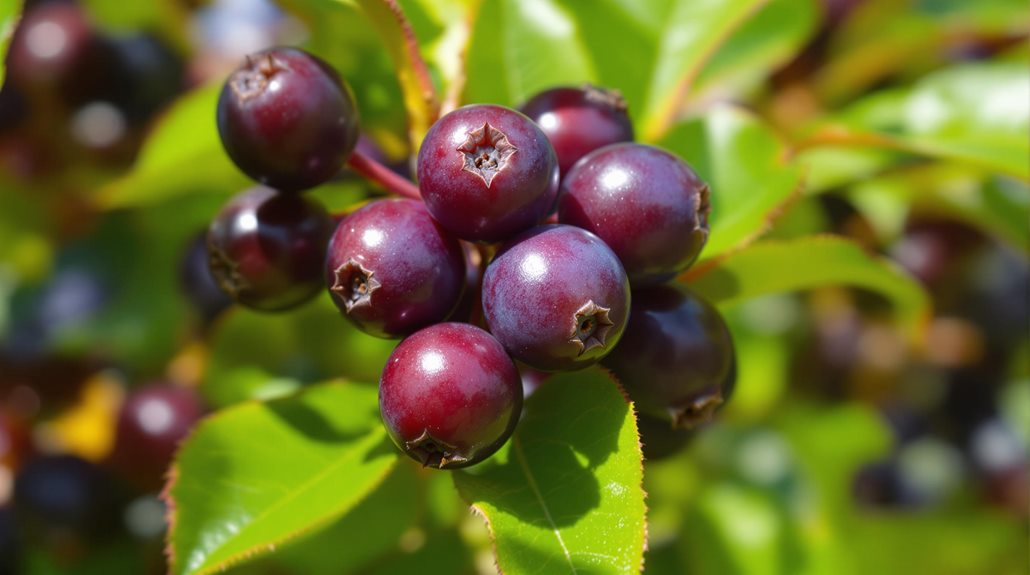
Amelanchier berries, often called serviceberries, are a delightful supplement to your diet, offering a sweet and juicy flavor that's hard to resist. These small berries pack a punch of vitamin C, giving you antioxidant benefits that support general health. Not only are they delicious, but they're also a smart choice for anyone looking to enhance their nutritional intake.
You'll find that Amelanchier berries are low in calories, with just about 50 calories per cup. This makes them an excellent snack option, especially if you're watching your weight. The high levels of dietary fiber in these berries aid in digestion and promote a feeling of fullness, helping you manage your appetite more effectively.
Incorporating Amelanchier berries into your meals is simple. Enjoy them fresh, bake them into pies, or use them to make jams and jellies. They add both flavor and nutrition to your dishes. Rich in anthocyanins and flavonoids, these berries have anti-inflammatory properties that may contribute to improved heart health. By adding Amelanchier berries to your diet, you're not only treating your taste buds but also supporting your heart and general wellness.
Salal Berry
Moving from the sweet and juicy Amelanchier berries, let's investigate the intriguing salal berry. Native to the Pacific Northwest of North America, salal berries, also known as Gaultheria shallon, grow on evergreen shrubs and have a distinctive dark blue to black hue. These berries pack a punch with their rich antioxidants, particularly anthocyanins, which are known for combating oxidative stress, potentially providing numerous health benefits.
Salal berries are not only low in calories but also high in dietary fiber, making them a fantastic supplement to your diet. They promote digestive health and help you feel full longer, contributing to satiety. The nutritional value of these berries has been recognized for generations, especially by Indigenous peoples who have traditionally incorporated them into multiple foods like jams and desserts, appreciating their unique flavor and sustenance.
While you might not find salal berries in your local store, you can forage them or use them in homemade dishes, especially from late summer to early fall. Their unique, slightly sweet flavor can add an exotic twist to your recipes, making them a delightful and healthful choice for adventurous eaters.




